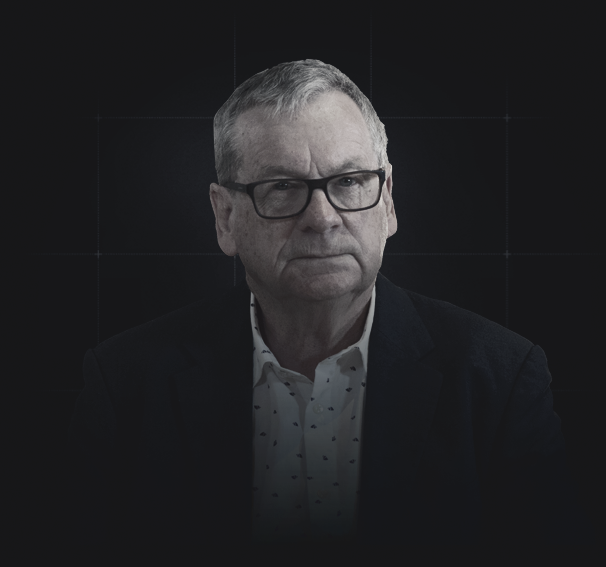Chris Masters
Four Corners
“Good journalism is essentially about good citizenship.’’
Chris Masters reported about 100 episodes for the ABC’s Four Corners, exposing corruption and criminal behaviour at the highest levels of politics, the judiciary and police. His reporting withstood waves of litigation and the test of time.
Multi-award-winning and highly honoured, Masters is one of the giants of Australian investigative journalism.
Career Timeline
1966: Masters joins the Australian Broadcasting Commission after completing the NSW Leaving Certificate. Like the majority of his six siblings and his journalist mother, he is drawn to a career in the media. His initial plan to work in the ABC’s camera department changes as an opportunity arises to work in radio.
1972: Raised in northern NSW near the Queensland border, Masters’ long-term aim is to build a career in regional journalism. He hones his journalistic skills working in radio at Albury, Newcastle, Kempsey and Tamworth.
1977: ABC Central Queensland appoints him as acting regional manager at ABC Rockhampton. His first television experience is producing and presenting ‘Focus’, a weekly current affairs program.
1980: Due to a family illness, Masters moves to Sydney, where he works on programs such as ‘A Big Country’, and ‘Countrywide’.
1983: Masters is employed as a senior reporter at ABC Four Corners under executive producer Jonathan Holmes. His story, ‘The Big League’, produced with Peter Manning, exposes judicial corruption in a case involving Rugby League’s then president and triggers a Royal Commission. On Four Corners over the next few years, Masters details a failed mission in Bass Strait in ‘Search without Rescue’; breaks an international exclusive story, ‘French Connections’, about the sinking of the Greenpeace flagship, Rainbow Warrior; uncovers Italian organised crime in Australia in ‘The Family Business’; and in 1987, exposes police and political corruption in Queensland in ‘The Moonlight State’, triggering a commission of inquiry and numerous convictions and substantial reforms.
1985: Masters wins a Gold Walkley for his Four Corners report on the sinking of the Rainbow Warrior.
1988: He moves from the ABC to Network Ten and works on the current affairs program, ‘Page One’, which later becomes ‘Public Eye’.
1990: Returning to the ABC, he works with Geraldine Doogue on ‘Hindsight’, a documentary history series that is short-lived.
1991: Masters re-joins Four Corners where he stays for 17 years. He spends much of the 1990s in court defending programs produced in the 1980s. Over a total of 25 years at Four Corners, he reports more than 100 episodes, becoming the longest-serving reporter on Australia’s longest-running current affairs program.
2009: Semi-retired, Masters works with Four Corners, News Corporation, Fairfax/Nine and other television networks on an occasional freelance basis. He is engaged in reporting and curatorial work at The Australian War Memorial and undertakes occasional work for the Australian Strategic Policy Institute.
2018: Breaks story with Nick McKenzie and David Wroe that war hero Ben Roberts-Smith is being investigated for alleged war crimes in Afghanistan. Roberts-Smith sues for defamation.
2021: Ben Roberts-Smith’s defamation trial begins.
2023: Justice Anthony Besanko dismisses the defamation suit. He finds that Roberts-Smith engaged in or was complicit in the unlawful killings of four unarmed prisoners. Roberts-Smith appeals; Walkley Foundation initiates the Masters-McKenzie Grant for Investigative Journalism.
2024: Defamation appeal begins.
Awards
1984: Walkley Award, best television current affairs report (with Gordon Bick).
1985: Gold Walkley Award, best piece of journalism newspaper, television or radio (with Bruce Belsham); Walkley Award, best television current affairs report (with Bruce Belsham).
1987: Penguin Award, Television Society of Australia.
1988: United Nations Association of Australia Media Peace Award (with Harvey Broadbent).
1995: TV Week Logie Award, most outstanding achievement in public affairs. (Four Corners report on the Rwanda genocide, ‘Inside a Holocaust”).
1996: Walkley Award, best international report on the Bosnia conflict. Four Corners, ‘The Cowards’ War’ (with Nick Greenaway).
2006: Voltaire Award, Free Speech Victoria.
2007: Queensland Premier’s Literary Award, literary or media work advancing public debate – the Harry Williams Award, for ‘Jonestown’; Australian Book Industry awards, Australian Biography of the Year, ‘Jonestown’; Walkley Award, best non-fiction book, ‘Jonestown’.
2013: Prime Minister’s Literary Award, finalist (Non-fiction) for ‘Uncommon Soldier’.
2017: Inducted into the Australian Media Hall of Fame, Melbourne Press Club.
2018: NRMA Kennedy Awards, outstanding investigative reporting (with Nick McKenzie); Prime Minister’s Literary Award, finalist (Non-Fiction) for ‘No Front Line’.
2020: MPC Grant Hattam Quill for investigative journalism (with Nick McKenzie).
2023: MPC Grant Hattam Quill for investigative journalism (with Nick McKenzie).
2024: Book of the Year Award; TV Week Logie Award, best news coverage or current affairs report (with 60 Minutes, 9 Network).
Honours
1999: Public Service Medal.
2001: Centenary Medal.
2006: Honorary Doctor of Communication, RMIT University.
2009: Honorary Doctor of Letters, University of Queensland.
2023: Walkley Honour for Media Freedom (with Nick McKenzie).
Books
Inside Story (Angus & Robertson, 1992).
Not for Publication (ABC Books, 2002).
Jonestown (Allen and Unwin, 2006).
Uncommon Soldier (Allen and Unwin, 2012).
No Front Line (Allen and Unwin, 2017).
Flawed hero: truth, lies and war crimes (Allen and Unwin, 2023).

